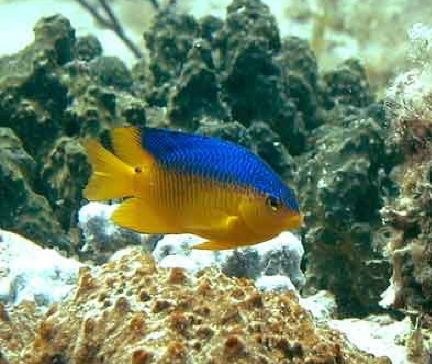Damselfish had trouble learning to avoid predators, when that lesson was accompanied by a soundtrack of buzzing boat engines. Christopher Intagliata reports.
雀鲷很难在嗡嗡的船舶引擎声音伴随下学习躲避捕食者。克里斯托弗·因塔利亚塔报导。
撰文/播音:克里斯托弗·因塔利亚塔(Christopher Intagliata)
翻译:姜帆
审校:郭晓
If you've ever gone snorkeling or scuba diving—you know how peaceful it sounds under there… <<reef sounds>>... aside from the crackling sound of snapping shrimp.
如果你曾经去浮潜或潜水——你会知道水下有多么安静…<珊瑚礁的声音>…除了枪虾噼里啪啦的声音之外。
Compare that to a reef with boat traffic. <<noisy reef>> Not quite as calming. And it gets on undersea creatures' nerves too: stressing out spiny lobsters, slowing the development of sea slugs.
将其与有船只来往的礁石对比。<嘈杂的礁石>后者并不那么平静。而且它也影响了海底生物的神经:增加龙虾的压力,减缓海蛤蝓的生长。
And now scientists have found one more side-effect of noise: impaired learning abilities, for fish. The study is in the Proceedings of the Royal Society B. [Maud C. O. Ferrari, School is out on noisy reefs: the effect of boat noise on predator learning and survival of juvenile coral reef fishes]
而且,科学家现在已经发现噪音的另一个副作用:损害鱼类的学习能力。该研究发表在《英国皇家学会学报B辑》中。
Researchers started by teaching juvenile damselfish in the laboratory about the predators they'd encounter, once they settled on an Australian reef. The training consisted of injecting the damselfishes' tanks with seawater fouled with both the scent of a predator, and alarm cues from injured damselfish. A message that, hey, this predator smell? It means dead friends. Maybe dead you.
研究人员选定了澳大利亚的一处珊瑚礁后,便开始在实验室教年幼的雀鲷关于他们将会遇到的捕食者的知识。培训包括向雀鲷的鱼池中注入含有特殊气味的海水,其中包含捕食者的气味和受伤雀鲷的警报信号。这种海水发出的信息是,嗨,闻到捕食者的气味了吗?这意味着朋友死了。也许是你死了。
To reinforce that lesson, they also lowered ziploc bags with the predators themselves into the damselfish's tanks, together with the scents, to teach them: these guys are your enemies.
为了加强学习效果,他们还将装有捕食者的保鲜袋放入雀鲷的鱼池中,伴随着捕食者的气味来教它们:这些家伙是你们的敌人。
They conducted all this training to a soundtrack of peaceful reef sounds <<quiet reef>> or with the added distraction of buzzing boat engines. <<loud reef>>. And they found that fish that trained with normal reef sounds were suitably spooked by the scent of a predator, later on. But fish exposed to boat noise? Totally unphased.
整个训练过程中,他们会播放宁静的礁石声音<安静礁>,或是添加嗡嗡的船引擎声的干扰。<嘈杂礁>。他们发现,在正常的珊瑚礁声音中训练的鱼,在后来被捕食者的气味惊吓到,受惊吓程度正常。但是暴露在船只噪音中的鱼呢?完全没有反应。
"It appeared that the presence of boat noise was interfering with the learning process. So when later on we said 'hey, here's a predator, are you scared?' they didn't respond."
“这表明船噪音的出现干扰了学习的过程。因此当我们稍后说‘嗨,这里有一只捕食者,你害怕吗?’它们并不回应。”
Maud Ferrari, a behavioral ecologist at the University of Saskatchewan. She says same thing held true in the real world, too, once they released the fish. Three days later, two thirds of the quiet-trained fish were still alive. Compared to only 20 percent of the fish trained with the boat noise backdrop…the same severe mortality rate suffered by fish with no training at all.
萨斯喀彻温大学的行为生态学家莫德·法拉利(Maud Ferrari)如是说。她说,一旦他们将鱼放归回大海,它们在现实世界中的反应也是如此。三天后,三分之二的训练有素的鱼还活着。相比之下,只有20%的在船只噪音背景中训练的鱼还存活......这与没有受过任何训练的鱼有着相同严重的死亡率。
The silver lining, Ferrari says, is boat noise is a stressor that local legislators can actually regulate. "You want to change the environment, slow down the warming, the acidification, but it's really out of our hands, you know what I mean? The results we found with noise pollution, what is nice is it's one of those stressors we can actually control."
法拉利说,一线希望是,船只噪音实际上是地方立法者可以管控的压力因素。 “你想改变环境,减缓变暖,酸化,但它确实超出了我们的能力范围,你明白我的意思吗?我们发现噪音污染的结果,好处是这是我们可以实际控制的压力因素之一。”
So that young fish can learn their lessons. Alone or in schools.
这样的话,年幼的鱼类就能学习了。无论是自学或是在学校。

 京公网安备11010502039775号
京公网安备11010502039775号  京公网安备11010502039775号
京公网安备11010502039775号 
















